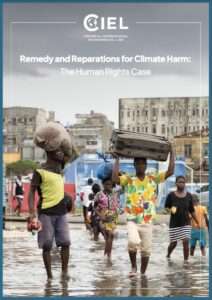
The climate crisis is undeniably a human rights crisis. Intensifying extreme weather events and slow-onset effects such as rising temperatures, persistent drought, and sea-level rise are leading to widespread human rights violations. Those impacts are disproportionately affecting individuals, Peoples, and communities who are in vulnerable situations due to historical and present marginalization and intersecting forms of discrimination, oppression, exploitation, inequality, and violence.
States have legal obligations to prevent, minimize, and remedy foreseeable human rights violations, including those due to the climate crisis. Such climate-related harm, also called loss and damage, is now widespread due to a failure to mitigate and provide adequate resources for adaptation.
“Remedy and Reparations for Climate Harm: The Human Rights Case” sets out the legal basis for demanding that States and corporations uphold their obligations to provide redress for
mounting climate harm.
The report describes how the human right to remedy applies to loss and damage in the context of the climate change-driven human rights crisis and examines the shortcomings of existing mechanisms under the United Nations Framework Convention on Climate Change (UNFCCC). An overview of the evolution and enforcement of norms related to remedy for climate harm underscores the important role of human rights institutions and courts in delivering climate justice.
Given the scale and scope of climate harm, providing effective remedy to those whose human rights have been, are being, and will be violated due to climate change requires complementary legal and policy approaches.
Read the key takeaways [September, 2024].
Published on November 28, 2024
